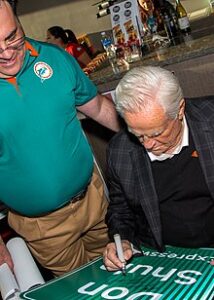By David Mullen
When a close member of family or friends dies, it is time for contemplation and retrospection. It may have been a grandfather, father, mentor or friend.
The winningest coach in NFL history — Don Shula — was all four of them to so many. Shula passed away in suburban Miami on May 4 at 90.

Pro football has changed so much throughout the decades marking Shula’s legacy. The game used to be based on smashmouth play and outstanding execution. Plays were simple and well thought out. Today, a playbook has as many pages as a James Michener novel, challenging players to comprehend.
There were few specialists. Quarterbacks like George Blanda, Dan Pastorini and Danny White also kicked. Green Bay Packer Donny Anderson was a star running back and punter. Lou “the Toe” Groza was an offensive lineman and place kicker. Players played multiple positions. Today, a long snapper can sign a multi-million-dollar contract.
Then, rosters were smaller. Today, rosters are bigger and so are the players. Speed was a valuable premium. Today, it is a given. Players had to earn every cent they were paid. Today, contracts are in the millions, not the thousands.
In Shula’s early years as a head coach, many players, especially lineman, had to get off-season jobs to help supplement their NFL incomes. In Oakland, a friend’s father owned a moving company and Raiders Dave Dalby, John Vella and others would move furniture to have rent and beer money.
In eight grade shop class, we were elated to find out that “Mean Ol’” Mr. Linder was going to be out for a couple of days and we were going to get a substitute teacher. Months of frustration would finally be exacerbated at the new instructor’s expense. That is, until Raiders All-Pro offensive tackle and future Hall of Famer Art Shell, at 6 foot-5 and 265 lbs., entered the shop room. Turns out Shell had attained a teaching credential from Maryland-Eastern Shore and had taken on a second job.
Donald Francis Shula was born on Jan. 4, 1930, east of Cleveland in Grand River, Ohio. He played football and earned a bachelor’s degree from John Carroll and a master’s in physical education from Western Reserve.
Shula experienced the game as an NFL player and a coach. While a running back in college, he was drafted as a defensive back by the Cleveland Browns in the 1950s and played for the Baltimore Colts and the Washington Redskins. In 1963, he was named head coach the Colts, at the time the youngest head coach in NFL history at 33. The Colts won the NFL Championship in 1968, only to lose to the New York Jets in Super Bowl III in a game that would be a key that gave credence to a merger between the NFL and AFL.
But Shula will always be remembered as the leader of the Miami Dolphins from 1970 until retiring in 1995. He mentored Hall of Fame quarterbacks Bob Griese and later Dan Marino. Shula and his Dolphins made history in 1972 with a 17-0 season, still the only undefeated season in NFL history. Despite stiff in-conference competition from Pittsburgh, Cleveland and Oakland among others, the team was so good that only kicker Garo Yepremian thinking for a moment that he was Joe Namath kept the Dolphins from shutting-out the Redskins in Super Bowl VII at the Los Angeles Coliseum.
Throughout the years, Shula wrote history and adapted as best he could through the massive changes within the league. There were the gregarious and colorful coaches in the 1970 and 80s like Hank Stram, George Allen, John Madden, Bum Phillips and Mike Ditka and the stoic leaders like Vince Lombardi, George Halas, Paul Brown, Bud Grant and Tom Landry. Shula coached against them all and was in a class of his own.
Known as an innovator and disciplinarian, he saw the league go from run first to pass orientation. He was adept at designing both an effective offense or stingy defense.
Shula would hold grueling practices in the South Florida heat. His teams won two Super Bowls and he was Coach of the Year four times. He was known for his calm — although a bit fiery early on — sideline presence and respect, coaching within the rules. In 33 seasons as a head coach, his team had a losing record in just two of them. Sons Dave and Mike became head coaches in the pros and college. A road runs through Miami named the Don Shula Expressway.
After football, Shula stayed busy. He remained a family man, played golf, was a spokesperson for Nutrisystem, owned a hotel and golf club, ran a chain of restaurants and high-end steakhouses in Florida, Chicago, Houston and Arizona with Shula in the name and made speaking and charity appearances. When his wife of 34 years Dorothy died in 1991, the Don Shula Foundation for Breast Cancer Research was founded. He remained a devout Catholic.
Shula took his retirement in stride. But one thing remained constant. “The toughest part will be in September,” Shula said upon his retirement, “when that ball is kicked off and for the first time in 43 years I won’t be on the sidelines. That is what I will miss most.” Shula was inducted into the Pro Football Hall of Fame in 1997.
Shula may have passed but his humility will live on forever. He will always, and at least for one season, remain unmatched and undefeated.
